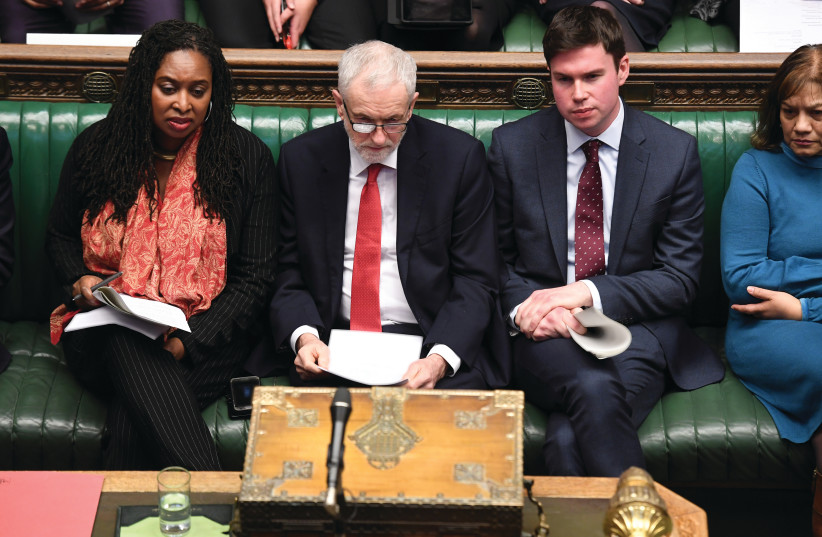 Jeremy Corbyn’s place in the history of antisemitism
Jeremy Corbyn’s place in the history of antisemitism
MANFRED GERSTENFELD
To define Corbyn’s antisemitism one can best say that he is a major post-modern antisemite, which expresses itself through many diverse acts and statements.

In August 2015, Jeremy Corbyn was only a candidate for the chairmanship of the Labour Party. The Guardian at that time already published that Corbyn had welcomed the extreme terrorist and genocidal antisemitic organizations Hamas and Hezbollah at the House of Commons. When Corbyn was elected chairman in September of that year, he did not feel the need to apologize for associating in a friendly way with people who desire to mass murder Jews.
Labour MPs did not revolt and protest that theirs was a mainstream party which cannot have a leader who calls terrorists who want to murder Jews his “brothers” and “friends.” With such a man at its head, Labour became almost by definition an institutionally antisemitic party. It was already somewhat tainted before as under previous leaders it had not expelled Corbyn in spite of his associations with terrorists, including the Irish IRA. This was a typical example of a radically wrong “Big Tent” approach, where people who are beyond the pale remain inside.
The history of progressive perversity goes back centuries. Under Corbyn’s leadership, Labour would write an important section of its large contemporary chapter.
In May 2016, prime minister David Cameron during question time in parliament asked Corbyn four times to withdraw his friendly remarks about Hamas and Hezbollah. Cameron said, “Those organizations in their constitutions believe in persecuting and killing Jews, they are antisemitic organizations, they are racist organizations. He must stand up and say they are not his friends.” Corbyn avoided apologizing in a straightforward way for his pro-terrorist statements.
In March 2019, scholar Alan Johnson, a Labour member, published a 135-page report which detailed the ways in which the party is institutionally antisemitic. He divided antisemitism in Labour into three categories: socialism of fools, classic racial antisemitism, and antisemitism as anti-Zionism.
In December 2019, The Daily Mail published an article on Corbyn’s 50 infamous moments of shame. It mainly listed his multiple associations with terrorists. A few weeks later the Labour chairman came out against the United States – and thus again in favor of a terrorist – saying, “The US assassination of Iranian General Qasem Soleimani is an extremely serious and dangerous escalation of conflict in the Middle East with global significance.”
Although Corbyn will resign formally only when a new Labour chair is elected in April, one can already assess his important place in the contemporary history of antisemitism. Yet it is far from simple to define it. A comparison with the leading antisemite in the United States, Louis Farrakhan, the leader of the Nation of Islam, makes this clearer. Farrakhan often expresses hatred toward Jews, and his rhetorical manifestations of antisemitism are directed at Jewish individuals.
FARRAKHAN echoed Nazi language when he used the word “termites” to describe Jews. Farrakhan has said that “satanic Jews had infected the modern world with poison and deceit.” He has called Jews “poisoners and absolute evil.”
One only has to put these statements next to the most common definition of antisemitism – that of the International Holocaust Remembrance (IHRA) – to understand that Farrakhan is an antisemite. One can do the same with British politicians who are (part-time) antisemites such as George Galloway and Lady Tonge.
Doing so with statements and acts of Corbyn doesn’t get us very far. His antisemitism is greatly different, yet far more important than Farrakhan’s in view of the position he holds. That the act of calling two Arab movements which aim to commit genocide against Jews his “brothers” and “friends” is hugely antisemitic requires little explanation. Yet none of the definitions of antisemitism includes explicitly such extreme cases.
Upon becoming Labour chairman, Corbyn almost immediately appointed the Hamas supporter Seumas Milne as executive director of strategy and communications. His leadership led rapidly to an explosion of antisemitic statements by various elected party officials.
Corbyn nominally condemned antisemitism, yet Labour greatly underperformed in dealing with the complaints about it. From a BBC Panorama program one learned that he and his immediate staff even protected people who had made antisemitic remarks.
In order to understand Corbyn’s huge contribution to the contemporary history of antisemitism, one has to comprehend a basic issue about current times that are known as “post-modernity.” In it, many themes have fragmented in a multitude of tiny parts.
So has antisemitism. To define Corbyn’s antisemitism one can best say that he is a major post-modern antisemite, which expresses itself through many diverse acts and statements. Scholars of antisemitism will have to familiarize themselves with this new concept as it is recurring.
Corbyn’s indirect antisemitic impact is far larger than seems from the above. Telegraph columnist Zoe Strimpel, who is Jewish, recently wrote about the British chattering classes, “What no dinner party-attending Jewish person can now avoid noticing is that at elite social gatherings in Britain and the US, dressing up brazen antisemitism as a form of political morality has become cool, acceptable and easy.” Jeremy Corbyn is indirectly to a substantial extent at the origins of this disastrous development in the UK.
